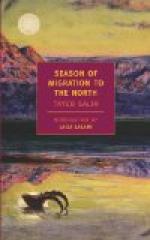When we pass the parallel of 55 deg.N. we come into a very wealth of new words, a vocabulary that has found its way into no dictionary but which is accepted of all men. The steep bank opposite us is a “cut bank,” an island or sandbar in a river is a “batture.” A narrow channel is called a “she-ny,” evidently a corruption of the French chenal. When it leads nowhere and you have to back down to get out, you have encountered a “blind she-ny.” The land we have come from is known as “Outside” or “Le Grand Pays.” Anywhere other than where we sit is “that side,” evidently originating from the viewpoint of a man to whom all the world lay either on this side or that side of the river that stretched before him. When you obtain credit from a Hudson’s Bay store, you “get debt.” A Factor’s unwillingness to advance you goods on credit would be expressed thus, “The Company will give me no debt this winter.” From here northward the terms “dollars” and “cents” are unheard. An article is valued at “three skins” or “eight skins” or “five skins,” harking back to the time when a beaver-skin was the unit of money. The rate of exchange to-day is from four skins to two skins for a dollar. Trapping animals is “making fur.” “I made no fur last winter and The Company would give me no debt,” is a painful picture of hard times. Whenever an Indian has a scanty larder, he is “starving,” and you may be “starving” many moons without dying or thinking of dying. “Babiche” in the North is the tie that binds, and “sinew” is the thread, babiche being merely cured rawhide from moose or caribou, the sinew the longitudinal strands taken from either side of the spinal column of the same animals.
[Illustration: Scouts of the Royal Northwest Mounted Police]
There is but one thing on this planet longer than the equator, and that is the arm of British justice, and the Mounted Police, these chaps sprawling at our feet, are the men who enforce it. The history of other lands shows a determined fight for the frontier, inch by inch advancement where an older civilization pushes back the native,—there are wars and feuds and bloody raids. Not so here. When the homesteader comes down the river we are threading and, in a flood, colonization follows him, he will find British law established and his home ready. The most compelling factor making for dignity and decency in this border-country is the little band of red-coated riders, scarcely a thousand in number. Spurring singly across the plains that we have traversed since leaving Winnipeg, they turn up on lone riverway or lakeside in the North just when most wanted.
Varied indeed is this man’s duty,—“nursemaid to the Doukhobor” was a thrust literally true. His, too, was the task on the plains of seeing that the Mormon doesn’t marry overmuch. He brands stray cattle, interrogates each new arrival in a prairie-waggon, dips every doubtful head of stock, prevents forest-fires, keeps weather records, escorts a lunatic to an asylum eight hundred miles away, herds wood bison on the Slave, makes a cross-continent dash from Great Slave Lake to Hudson Bay, preserves the balance of power between American whaler and Eskimo on the Arctic edge!




